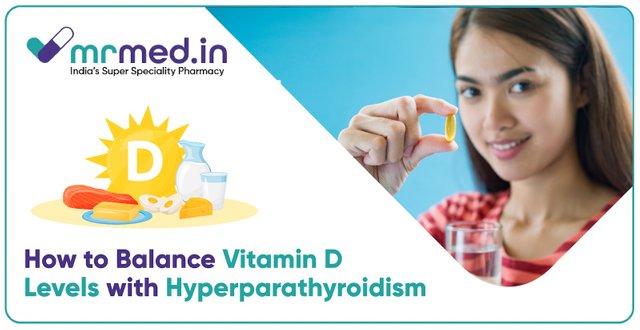Vitamin D and Hyperparathyroidism: A Complicated Relationship
Have you been feeling unusually tired, achy, or foggy-headed lately? It might be more than just a long week. Many people don’t realise that vitamin D deficiency can quietly trigger a chain reaction in your body—one that may involve your parathyroid glands. Yes, the sun vitamin and those tiny glands in your neck have a more intense connection than you'd expect. Let’s untangle this tricky relationship before it messes with your health.
What happens if you don't get enough vitamin D?
Vitamin D plays a critical role in helping your body absorb calcium from the food you eat. Without enough of it, your bones start losing strength, and your body struggles to maintain essential functions. One of the most common signs of vitamin D deficiency is fatigue. Others include muscle weakness, bone pain, mood swings, and even frequent illnesses due to a weaker immune system.
When vitamin D levels drop, your body tries to maintain balance. That’s where your parathyroid glands step in. They release parathyroid hormone (PTH), which pulls calcium from your bones to keep your blood levels normal. This overworking of the glands can lead to hyperparathyroidism. It’s like forcing your backup system into overdrive.
Why do parathyroid glands act up when vitamin D is low?
Your body’s calcium balance is tightly controlled. When vitamin D is lacking, calcium absorption from your diet goes down. To keep blood calcium levels stable, the parathyroid glands start pumping out extra PTH. It’s their way of shouting, “Help! We need more calcium!”
Over time, this constant demand leads to elevated PTH levels—a condition known as secondary hyperparathyroidism. Left unchecked, this can result in weakened bones, kidney stones, and calcium deposits in places you definitely don’t want them.
Can vitamin D cause parathyroid problems, too?
Yes, ironically, too much vitamin D can also create trouble. High levels may lead to increased calcium absorption, which might overload the body and strain the parathyroid glands. However, this is quite rare and usually occurs from excessive supplementation, not sunlight or food.
So, it’s all about balance. Too little or too much vitamin D can send your system spiralling. This is why regular monitoring and guided supplementation are key if you're dealing with any parathyroid or calcium issues.
How is hyperparathyroidism related to vitamin D?
In cases of primary hyperparathyroidism, one or more of the parathyroid glands become overactive. They keep producing PTH even when calcium levels are already high. This condition may mask or even worsen vitamin D deficiency, making diagnosis a bit tricky.
Doctors often check vitamin D levels in people suspected of having hyperparathyroidism to avoid misdiagnosis. Correcting the deficiency can sometimes reduce PTH levels, especially if the problem is secondary hyperparathyroidism.
But don’t self-medicate. A balanced approach under medical supervision is essential. If surgery isn’t required, certain medications might help manage the condition without extreme measures.
How do doctors treat vitamin D-related parathyroid issues?
Treatment depends on the type and cause. If low vitamin D is triggering the problem, doctors usually recommend supplementation. This helps restore calcium absorption and reduces PTH levels over time. However, if the glands are damaged or a tumour is involved, surgery might be needed.
In some cases, patients are prescribed medications that mimic calcium in the blood to reduce PTH production. One such example is Cinacalcet, which is often used in people with chronic kidney disease and secondary hyperparathyroidism.
Diet and lifestyle also matter. A calcium-rich diet, safe sun exposure, and routine checks can make a big difference.
How can I protect my bone health if I have parathyroid problems?
Start with the basics—know your vitamin D status. A simple blood test can reveal if you're running low. If you’re diagnosed with hyperparathyroidism, get a clear plan from your doctor that covers vitamin D, calcium intake, and overall bone health.
Exercise, especially weight-bearing activities, can strengthen your bones. And remember, don’t skip your follow-ups. Parathyroid conditions can quietly cause long-term damage if ignored.
Also, medications like a PTH tablet might be prescribed in certain scenarios where hormone regulation needs support. But again, only under professional guidance.
What should I do if I suspect a vitamin D deficiency?
First, don’t panic. Vitamin D deficiency is common and treatable. Talk to your doctor about getting tested, especially if you’ve been indoors a lot, wear sunscreen daily, or live in an area with limited sunlight.
They may recommend dietary changes, supplements, or lifestyle tweaks. The key is to act early before the deficiency triggers other issues like hyperparathyroidism.
Final thoughts
Your body is smarter than you think. When something’s off, like vitamin D, it sends signals. Your parathyroid glands respond, sometimes too much, causing more problems down the line. But when caught early, this cycle can be stopped or even reversed.
Listen to your body. Fatigue, aches, mood changes—these aren’t just “in your head.” They could be signs of a bigger hormonal loop gone haywire. And if that loop involves vitamin D and your parathyroids, a little sunlight and the right care can go a long way.
